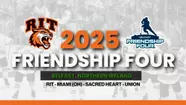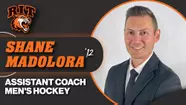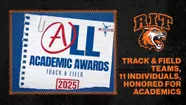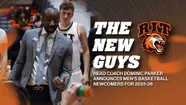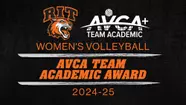More than just a hockey player
By Tim Volkmann
When Engine 632 pulled out of Henrietta Fire District Station 3 on a wintry afternoon last February, Doug Scott was one of five volunteer firefighters who had jumped aboard to answer a fire call. Only a slap shot away from the entrance to the nearby RIT, Scott would normally have been perched atop his rainbow-colored skateboard, weaving through students on his way to class. But instead, he was geared up in the back of a fire engine screaming toward a burning house.
Many will remember Scott for a different uniform—the orange and white No. 25 hockey jersey he wore on game nights at the Gene Polisseni Center the last four years. However, everything he accomplished off the ice might ultimately define the impact he had before walking across a commencement stage this past spring.
Born in North Vancouver, British Columbia to parents who met during a hockey game—John serving five-minutes for fighting and Brenda working the penalty box—Scott spent most of his childhood with a hockey stick in hand. His junior hockey journey later took him across Canada, in some cases playing for four teams in a single year, until he landed with a team in the small town of Humboldt, Saskatchewan in 2019. However, the coronavirus pandemic cut the following season short after only six games, leaving him with nothing but time to consider his next move.
"When I was 7 years old, my best friend's dad was a fireman, and he took us on a tour of his firehouse. Sliding down the fire pole was the highlight, but I also remember how team-oriented he said being a fireman was," recalled Scott. "When I was playing juniors, I wasn't sure if hockey would help me get an education, so I always had the possibility of becoming a firefighter in the back of my mind."
Scott looked into becoming a volunteer with the Humboldt fire department, but they weren't accepting applicants due to the pandemic. That was about the same time the RIT men's hockey staff first watched his film on the ice, and before he knew it, Scott had accepted an offer from Head Coach Wayne Wilson to become a Tiger.
"Doug was always a yes-sir, no-sir kind of guy with a strong work ethic who earned everything he got," said Wilson. "While he came in with a very talented class and ice time was at a premium, I never recall once having to say, 'Doug, you need to work harder.'"
Scott focused primarily on acclimating himself to college life during his first year on campus, prioritizing class and homework when he was off the ice. But when the season ended, he once again found himself with a lot of downtime.
"I was playing video games and watching television a lot, but I knew I wasn't really benefitting myself or others," said Scott. "So I wanted to find a better way to spend my time."
Scott filled out an online application to become a volunteer firefighter. He also joined the Student-Athlete Advisory Committee (SAAC), became an intramural sports referee and also taught himself how to play guitar. On the ice, he was seeing limited playing time, but his commitment to the team was felt in other ways.
"A lot of our success is because of the guys who weren't the so-called stars," Wilson added. "Contributions come in many ways and it takes players filling different roles to have a winning team. I can't say enough about how Doug never had a gloomy look on his face or was a disruption in the locker room. He would rather be remembered as a great teammate more than anything."
Said Scott, "I always tried to have the same mindset every single day. I did my best to give everything I had and work as hard, if not harder, than everyone else. When I finally got my chance, I'd like to think it was an accumulation of everything else. You have to be the best person you can be and, when the opportunity comes, you have to be ready."
Scott started firefighter training during the summer before his junior year and, while the team was putting together a run to what eventually culminated in an Atlantic Hockey Championship and an appearance in the NCAA Tournament, Scott was also spending two nights a week at the firehouse. Afternoons that included body checking teammates in practice and watching film breakdowns of RIT's next opponent were often followed by nights slinging 100-foot fire hoses and watching film about fire behavior and scene safety management.
"Doug is a real-life Swiss army knife," said teammate Philippe Jacques. "You never knew what position he was going to play, or if he was just going to play his harmonica while singing a song he wrote. Not many people know he's done stand-up comedy and is also an avid wood carver—you should see the clock he made me. When he leaves the house, he might be fighting fires--or maybe crime. I wouldn't put it past him."
Scott graduated as a volunteer firefighter last January after completing the required 126 hours of training. And, unlike most seniors enjoying their final semester of college, Scott's days sometimes included answering EMT calls and assisting at the scene of motor vehicle accidents. And if he wasn't busy enough, he had also been voted SAAC President.
Scott was also playing his final season of hockey, and for most players, game days were typically reserved for rest and preparation. On one such Friday last February, Mercyhurst was RIT's opponent du jour when Scott's afternoon was interrupted by what soon would prove to be quite the opposite.
Said Scott, "We got the call at 1 p.m. and when we arrived on the scene, the fire chief immediately told us our team was on deck to go in."
The scene was a garage engulfed in fire with a burning car parked outside. Scott watched as the rising flames, which had already collapsed the garage roof, set their sights on the rest of the house while smoke billowed into the sky over the residential neighborhood.
"Before I knew it, I had pulled my mask over my face, grabbed a 10-foot pike pole and was tearing down drywall, looking for hidden fires in the walls and ceiling. The air in the living room was hazy at first, but it quickly grew dark as black smoke started to pour in, which meant unused fuel from the car was burning. It was light outside, but it became pitch black inside and you couldn't see the person standing in front of you. That's when it got legit."
One of Scott's teammates who had been on the hose spraying down walls reported an issue with his oxygen and had to exit. So Scott took over.
"My teammates had started knocking out glass to help with the smoke when I got a tap on the shoulder, `Hey, fire down that way to the left through the door!'"
Scott walked down the hall and let the flames have it with the hose, full throat. Before long, he got another tap on the shoulder. And another. And another.
"I heard my teammates yell, `to your right!' and I sprayed the heck out of a stairwell completely in flames. Then it was, `Behind you!' and I was saturating more flames. Then, someone ripped apart a wall and flames shot out from underneath. It was crazy."
Over the next 20 adrenaline-filled minutes, Scott and the rest of the crews put the fire out. No one was inside the house when it had gotten out of control and all his teammates were safe. So it was time to roll up the hoses and cleanup the scene before heading back to the station.
After a quick stop at home, it was on to the GPC to play a hockey game. The Tigers earned a 3-2 victory that night and, while Scott didn't register any statistics, he likes to believe his story inspired his other roommate, Xavier Lapointe, to score what proved to be the game-winning goal.
"Doug wasn't just another tire-kicker looking to become a firefighter without having any idea of the time commitment," said Lieutenant Patrick Berry, the officer in charge of Engine Company 632. "I've been very impressed with his commitment and work ethic, juggling school and hockey while training to be a firefighter. He also got to the firehouse quickly enough that day to make it on the engine and worked hard despite having a game to play later that night. He was probably tired, wet, cold, and smelled like smoke but he still went and played the game."
Other than his head hitting the pillow, Scott doesn't remember much from when he got home that night. But when you are a hockey playing, fire-fighting, guitar-strumming, wood carving stand-up comedian president of the student-athlete advisory committee, you can't blame him if sleep comes fast.
Earning a degree in global business management in May, he started EMT training earlier this summer and also applied to take a certification course to drive fire trucks. Scott is also scheduled to take a civil service test in hopes of becoming a career firefighter someday soon.
"It's a bit annoying because there was so much I wanted to do the last four years, but not enough time to give it all 100 percent," Scott lamented. "But I did everything because I wanted to. Not because I had to. And as soon as you have to do something, it is no fun anymore."
Tim Volkmann is the Director of Athletic Communications at RIT.

Players Mentioned
Players Mentioned
Latest Women's Crew
- Join Men's Hockey in Belfast, Northern Ireland for the 2025 Friendship FourRIT Men's Hockey is proud to be one of just a few teams selected to compete in the prestigious Friendship Four Tournament in Belfast, Ireland! Join us at the SSE Arena this November for an unforgettable week of hockey and Irish culture.
- Mitchell '16 named Assistant Men's Hockey CoachROCHESTER, N.Y. – New RIT Men's Hockey Coach Matt Thomas announced former Tiger captain Josh Mitchell '16 has been named Assistant Coach heading into the 2025-26 season.
- Madolora '12 named Men's Hockey Assistant CoachROCHESTER, N.Y. – New RIT Men's Hockey Coach Matt Thomas announced former All-American goaltender Shane Madolora '12 has been named Assistant Coach heading into the 2025-26 season.
- Track & Field teams, 11 individuals, named USTFCCCA All-AcademicROCHESTER, N.Y. - The RIT Men's and Women's Track & Field teams were named 2025 NCAA Division III All-Academic by the U.S. Track & Field and Cross Country Coaches Association (USTFCCCA) while 11 individuals were tabbed All-Academic Athletes.
- Men's Basketball announces incoming classROCHESTER, NY. – RIT Men's Basketball coach Dom Parker announced the addition of eight new Tigers to the program, Wednesday afternoon.
- Women's Volleyball receives AVCA Team Academic awardROCHESTER, N.Y. – The RIT Women's Volleyball team received the American Volleyball Coaches Association Team Academic Award for the 2024-25 academic year.








